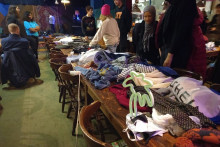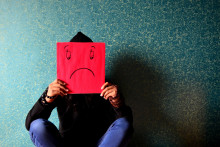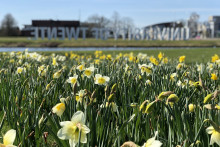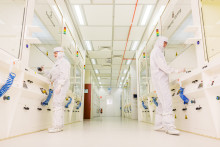Erasmus Student Network (ESN) organised the swap as part of their environmental sustainability goal. Since it was closely related to an event that the UNICEF student team was planning on, they partnered up. In Tankstation, a cultural centre in the heart of Enschede, multiple tables were filled with clothes. Participants could bring their own clothes and swap them for the ones on the tables or donate them. Stanimir Mihov from ESN tells that all leftover clothes will be donated to the Salvation Army. He explains that this event supports environmental sustainability by offering second-hand clothes instead of fast fashion.
The UNICEF student team were present for the same reason. In a presentation, UT student Havva Toduk tells us that the production of new clothes is very unsustainable: ‘One pair of jeans costs 7000 litres of water to make, to grow all cotton needed for production.’ She mentions that we should think about this when we realise that millions of people do not have access to safe drinking water.
Uganda
The UNICEF team was not at the event for the clothing swap only. They wanted to promote their current project as well. Every year, student teams of UNICEF from all over the country try to raise awareness and funds for a new project. This year it is all about project Uganda. Rajesh Gangireddy, chairman of the UNICEF team, mentions that Uganda hosts the most refugees in all of Africa. ‘A lot of these refugees are children and come from neighbouring countries.’ Toduk adds: ‘UNICEF aims to help these children with psychosocial support, to teach them how to deal with stressful and traumatising situations.’
Last year's fundraiser was a success, says Gangireddy. The UNICEF team raised about 400 euros with their previous project about malnutrition in Burundi. However, the Dutch student teams make it a real competition to see who can raise the most money. The team in Enschede is not close to the giant teams from Delft or The Hague yet, but they have some plans. ‘Collecting deposit bottles turned out to be successful last year and we are planning on selling waffles on campus. Also, we are still in the process of getting recognised by the Student Union, which would make our on-campus activities a lot easier.’
Thrift shop
At ESN, they have some future plans as well. ‘Regarding environmental sustainability, we plan on organising vegan cooking evenings and we allow our members to get a discount at a thrift shop’, says Mihov. But we have more goals, of which health and wellbeing is one. Conferences on mental health with invited guest speakers are on the schedule.’ Both ESN and the UNICEF student team are open to new members and volunteers.







